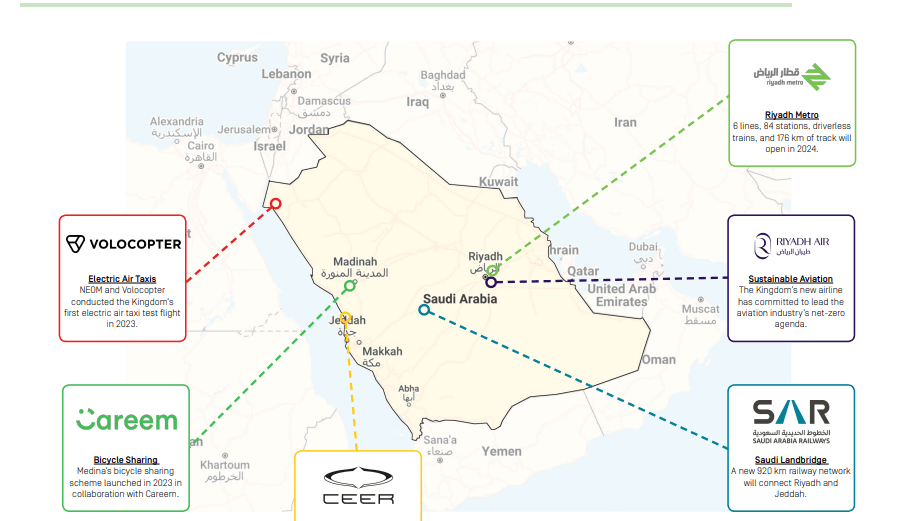Saudi Sustainable Transportation: Paving the Way for a Green Future
Saudi Arabia’s ambitious Vision 2030 has sparked a transportation revolution that seamlessly integrates sustainability with the Kingdom’s rapid modernization. Against the backdrop of its arid landscapes, Saudi Arabia is making significant strides in adopting green technologies, reimagining urban planning, and creating an interconnected multimodal network. These advancements firmly establish Saudi Sustainable Transportation as a cornerstone of its developmental agenda.
A New Era of Electric Vehicles

The Kingdom is making electrification a key pillar of its transportation framework. By 2030, Saudi Arabia aims to produce 500,000 electric vehicles annually, with production hubs forming in King Abdullah Economic City. Pioneering brands like Lucid and Ceer Motors are leading this charge, backed by robust investments. Supporting this surge in EV adoption is a well-thought-out expansion of charging infrastructure. For instance, The Electric Vehicle Infrastructure Company (EVIQ) launched in 2023, is working towards a nationwide network of fast-charging hubs. These developments are transforming the once fuel-dependent nation into a beacon for sustainable automotive innovation.
Public Transport Goes Multimodal
Saudi Arabia is also revolutionizing public transit with bold initiatives across rail, metro, and bus networks. Riyadh Metro, set to feature six lines and 176 km of track in its first phase, is nearing completion, signaling a massive leap in urban mobility. Meanwhile, new bus networks in cities like Riyadh and Jeddah, coupled with intercity routes, are creating reliable and efficient alternatives to car travel. The Kingdom’s train networks, including the Haramain High-Speed Rail and the East Train, demonstrate how rail connectivity can enhance accessibility while reducing carbon footprints. This is further complemented by the rollout of electric buses in major cities like Jeddah and Medina.
Innovations in Active Travel
Sustainability isn’t just about advanced technologies—it’s also about empowering low-impact mobility options. Saudi Arabia’s recent initiatives around cycling and pedestrian-friendly infrastructure are evidence of this commitment. Medina now boasts 70 km of interconnected cycling paths, while Jeddah’s scenic 4.5 km waterfront track adds an eco-friendly layer to tourism. The growing availability of bike-sharing services and electric scooters is helping people shift towards active travel modes that are both environmentally conscious and convenient.
The Role of Urban Planning and Aviation
The Kingdom’s updated Sustainable Planning Guidelines aim to align its urban growth with transportation advancements, promoting walkable cities and better integration between infrastructure and services. Additionally, Saudi Arabia’s vision for aviation, which includes the net-zero Riyadh Air set to launch in 2025 and the expansion of King Salman International Airport, underscores its commitment to sustainable mobility at all scales.
Redefining the Desert Kingdom’s Future
The transformation of Saudi Arabia’s transport systems is nothing short of groundbreaking. From the deployment of EVs and hydrogen-powered taxis to high-speed rail and multimodal hubs, Saudi Sustainable Transportation is positioning the nation as a leader in sustainable mobility. The seamless blend of advanced technologies, strategic planning, and a focus on environmental stewardship is enabling the Kingdom to turn its ambitious goals into reality.
Also Read: Why Chinese Car Tech is Making Waves in Saudi Arabia

